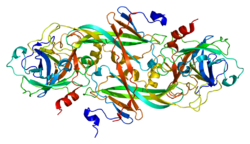| F11 | |||||||||||||||||||||||||||||||||||||||||||||||||||
|---|---|---|---|---|---|---|---|---|---|---|---|---|---|---|---|---|---|---|---|---|---|---|---|---|---|---|---|---|---|---|---|---|---|---|---|---|---|---|---|---|---|---|---|---|---|---|---|---|---|---|---|
 | |||||||||||||||||||||||||||||||||||||||||||||||||||
| |||||||||||||||||||||||||||||||||||||||||||||||||||
| Identifiers | |||||||||||||||||||||||||||||||||||||||||||||||||||
| Aliases | F11, FXI, coagulation factor XI, PTA, factor XI | ||||||||||||||||||||||||||||||||||||||||||||||||||
| External IDs | OMIM: 264900; MGI: 99481; HomoloGene: 86654; GeneCards: F11; OMA:F11 - orthologs | ||||||||||||||||||||||||||||||||||||||||||||||||||
| |||||||||||||||||||||||||||||||||||||||||||||||||||
| |||||||||||||||||||||||||||||||||||||||||||||||||||
| |||||||||||||||||||||||||||||||||||||||||||||||||||
| |||||||||||||||||||||||||||||||||||||||||||||||||||
| |||||||||||||||||||||||||||||||||||||||||||||||||||
| Wikidata | |||||||||||||||||||||||||||||||||||||||||||||||||||
| |||||||||||||||||||||||||||||||||||||||||||||||||||
Factor XI, or plasma thromboplastin antecedent, is the zymogen form of factor XIa, one of the enzymes involved in coagulation. Like many other coagulation factors, it is a serine protease. In humans, factor XI is encoded by F11 gene.[5][6][7][8]
- ^ a b c GRCh38: Ensembl release 89: ENSG00000088926 – Ensembl, May 2017
- ^ a b c GRCm38: Ensembl release 89: ENSMUSG00000031645 – Ensembl, May 2017
- ^ "Human PubMed Reference:". National Center for Biotechnology Information, U.S. National Library of Medicine.
- ^ "Mouse PubMed Reference:". National Center for Biotechnology Information, U.S. National Library of Medicine.
- ^ Fujikawa K, Chung DW, Hendrickson LE, Davie EW (May 1986). "Amino acid sequence of human factor XI, a blood coagulation factor with four tandem repeats that are highly homologous with plasma prekallikrein". Biochemistry. 25 (9): 2417–24. doi:10.1021/bi00357a018. PMID 3636155.
- ^ Asakai R, Davie EW, Chung DW (Nov 1987). "Organization of the gene for human factor XI". Biochemistry. 26 (23): 7221–8. doi:10.1021/bi00397a004. PMID 2827746.
- ^ Kato A, Asakai R, Davie EW, Aoki N (1989). "Factor XI gene (F11) is located on the distal end of the long arm of human chromosome 4". Cytogenetics and Cell Genetics. 52 (1–2): 77–8. doi:10.1159/000132844. PMID 2612218.
- ^ Buetow KH, Shiang R, Yang P, Nakamura Y, Lathrop GM, White R, Wasmuth JJ, Wood S, Berdahl LD, Leysens NJ (May 1991). "A detailed multipoint map of human chromosome 4 provides evidence for linkage heterogeneity and position-specific recombination rates". American Journal of Human Genetics. 48 (5): 911–25. PMC 1683054. PMID 1673289.




